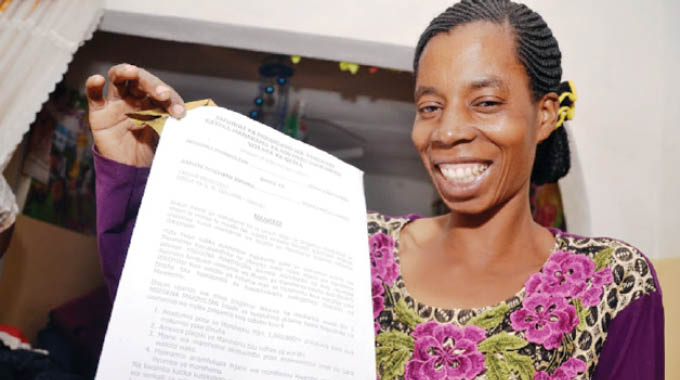How protected are women after their husbands die?

Gender, Bongiwe Nkomazana
I was talking to my parents not so long ago explaining to them the importance of putting issues like their will and funeral policies in order before, God forbid, they leave this Earth. I am the first born and I will fight any ‘‘MaNgulube’’ who will try to invade our home and harass my mother after my dad is no more. We laughed. However, this is an extremely difficult but crucial subject that cannot be avoided.
Last week we touched on how the dynamics of relationships have changed. Today we do not only find the conventional “married” couples.
We also have couples who are not ‘‘married’’ but have been committed to each other for a long time coming to them sharing space, children and businesses and so on.
I want us to think about how protected the women in these different but committed relationships are particularly after their significant other passes on. Everyone in a committed relationship knows the amounts of time, effort and money that go into making things work regardless of whether there is a marriage certificate or not. Hence, for anybody to come through and take away what you and your person have built is grossly unfair.
Marriage in our society is prioritised, we all know that. This is why the law is clear about how a formal wife is protected. There are currently two formal marriage systems which coexist in Zimbabwe, the customary law marriage and the civil marriage.
What is referred to as a customary law marriage is that traditional union which applies to indigenous people in Zimbabwe. Then we have the civil one which takes place without any religious affiliation and meets the legal requirements of the state or location of the wedding. The rest of the relationships are only treated like a marriage if they make the stipulated time cut.
I witnessed a situation where a certain man passed away. He had a civil marriage and the wife is the only wife we knew. However, at the time of his passing a number of other women came forward claiming to have been married to this man as well. As you can imagine, it became a very chaotic situation. Not only was there confusion on who would sit on the mattress as the bereaved wife, but this meant that they were also entitled to whatever wealth this man had.
Last I heard was that lawyers had been involved and what not. I could not help but think how unfair all of this was to all the “wives” though. If none of them knew about each other and each of them was contributing wholeheartedly to this man’s businesses and the like how would you measure what each woman and her children should get?
I do not know the matrimonial laws in depth but I am certain that the wife who would be recognised by the law is the one who was in the civil marriage. I do not think it is possible to marry more than one woman and have it recognised by the state. Right? That is one situation that happens in real life that leaves women in vulnerable positions.
Another situation that we hear of a lot has to do with culture. In some cultures, once a man dies his relatives flood to his home.
They are not there in numbers because they loved him nor are they there for the free food but they are there for the property. As soon as he is safely under the ground, they strip the home that he shared with his partner of everything; from the curtains and the beds, all the way to the teaspoons in the kitchen.
Some women have it so bad because they are harassed by their in-laws and are even driven away from the empty house. Now from my understanding, culture is meant to protect its people and preserve their identity. How does leaving a widow with nothing do any of that? There a number of things that are done in the name of culture or religion that are not healthy to the mind, body or soul.
Fortunately, Zimbabwean law provides for relatively equal property and inheritance rights for men and women. However, for some reason, only a few women formally own the property held in their marriage despite having worked for it.
Girls! Make sure your names are on those title deeds. It is not respect nor is it submission to have only your man on there. Men! To protect your partner, even from the grave, make sure her name is on everything she deserves to have. Put in on paper that only my wife/partner can have the house, the car the bed and all the teaspoons.
Make her untouchable. This will serve your family well. The Human Rights Watch explains that because women tend to forego having their names on the properties, their ability to keep the property they shared with their husband upon the death of their husband becomes dependent both on proving their marriage, which can pose great challenges, and on warding off in-laws intent on property grabbing.
With customary marriages it could be a different story because the marriage’s foundation is tradition/culture. Hence, as a good ‘muroora, it would be hard for you to resist when your in-laws come for your things.
In this day and age, some families have a rule that, only the men from the husband’s side are entitled to inherit land and property. And they insist that the widows will be protected and provided for by the male in-laws who inherit it. The thought of this just makes me uneasy but some people, the widows in question included, take their traditional ways very seriously.
I know for a fact that Zimbabwe’s legal system likes to preserve the indigenous customs. My thoughts are that in that preservation we still need to identify the acts that leave a Zimbabwean woman at a disadvantage because she is a citizen and needs to be protected still.
The Human Rights Watch goes on to say that the government of Zimbabwe should promote customs and practices that favour women’s equal rights to land and other assets including through inheritance, and engage traditional leaders in discussions about interpretations of customary laws that recogniSe equality of men and women.
I agree.
So gentlemen in marriages and relationships, whilst you still have life in your bodies do some research on how you can protect your partners in all situations.
Take the necessary legal steps to ensure that your properties and your finances always land in the hands that they are meant for. We all work hard for our families and true hard work is displayed through the life your loved ones will live way after you are gone.











Comments